Marilyn Hamilton's Blog, page 34
September 5, 2019
Waking Up the Human Hive: Act 2 Work is Love in Action
This series of blogs forms Integral City’s contributions to Paul van Schaik’s Urban Hub Volume 15 – Thrivable Cities Graphic Book.
We imagined a Dance in 3 Acts based on the Findhorn Foundation’s 3 Principles:
Prelude+
Deep Inner Listening
Work is Love in Action
Co-Creating with the Intelligences of Nature
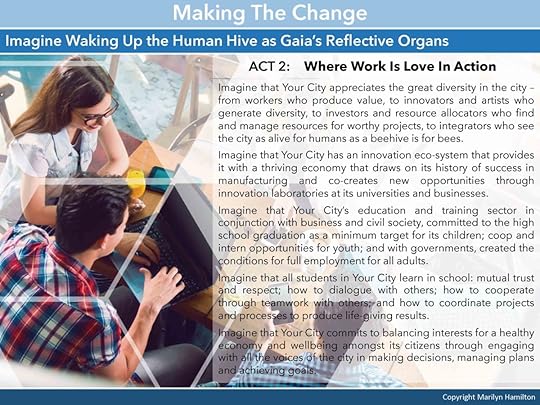
Imagine Waking Up the Human Hive: Act 1 Deep Inner Listening
This series of blogs forms Integral City’s contributions to Paul van Schaik’s Urban Hub Volume 15 – Thrivable Cities Graphic Book.
We imagined a Dance in 3 Acts based on the Findhorn Foundation’s 3 Principles:
Prelude+
Deep Inner Listening
Work is Love in Action
Co-Creating with the Intelligences of Nature
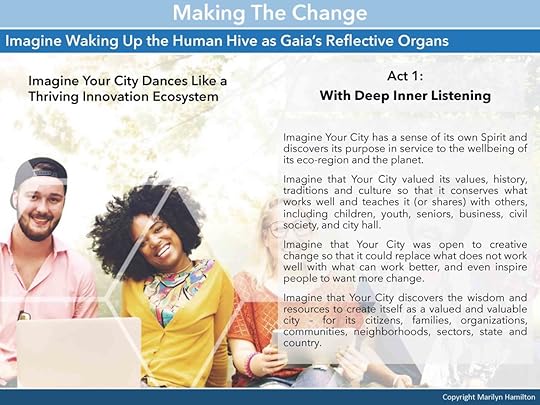
Imagine Waking Up the Human Hive: Dance Prelude
This series of blogs forms Integral City’s contributions to Paul van Schaik’s Urban Hub Volume 15 – Thrivable Cities Graphic Book.
We imagined a Dance in 3 Acts based on the Findhorn Foundation’s 3 Principles:
Prelude+
Deep Inner Listening
Work is Love in Action
Co-Creating with the Intelligences of Nature
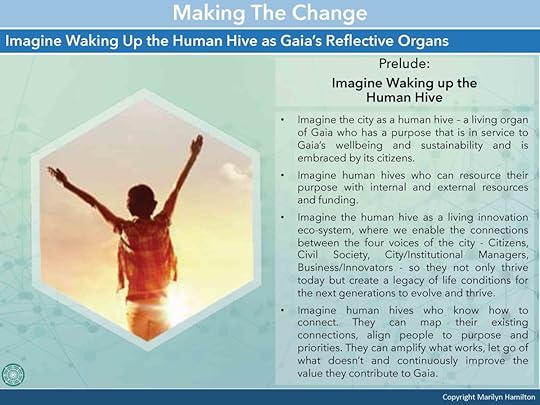
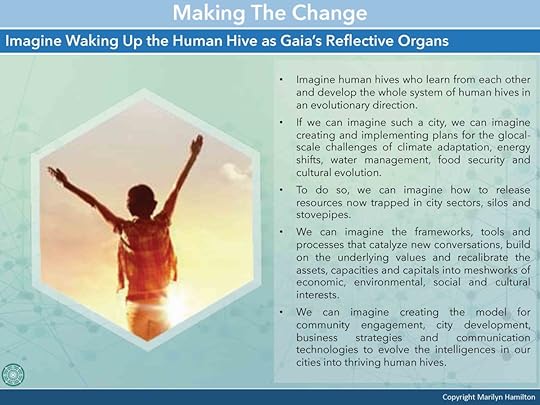
Imagine Waking Up the Human Hive: A Dance in 3 Acts
This series of blogs forms Integral City’s contributions to Paul van Schaik’s Urban Hub Volume 15 – Thrivable Cities Graphic Book.
We imagined a Dance in 3 Acts based on the Findhorn Foundation’s 3 Principles:
Prelude+
Deep Inner Listening
Work is Love in Action
Co-Creating with the Intelligences of Nature
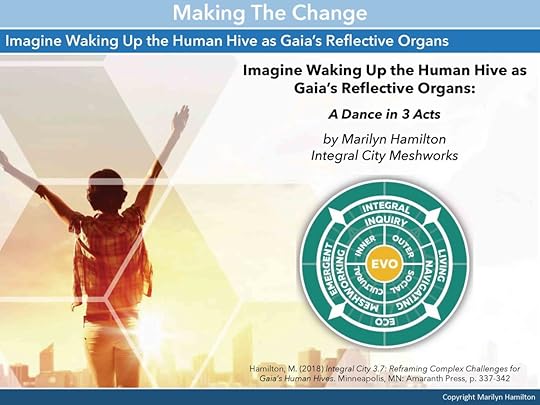
August 13, 2019
Gaia’s Reflective Organ: Marilyn’s Spiritual AQtivism Journey
This is an open letter to Alastair McIntosh who focalised the Spiritual Activism: Leadership as Service workshop at Findhorn Foundation Aug 3-8, 2019.
Dear Alastair
I am sure that the impressions and impacts of your Spiritual Activism workshop will unfold over many weeks. But I wanted just to record some initial impressions before they are absorbed on the “battlefield of life.”
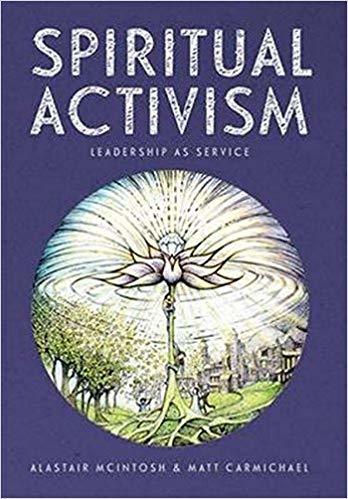
I will relate the workshop to the intentions that I set to evolve the framework for the keynote that I will be giving at the Ecocity World Summit in Vancouver on October 8, 2019.
My acting title for that session is: From Findhorn Bee Hive to Vancouver Human Hive: How Evo and Eco Evolve Gaia’s Reflective Organ.
The occasion is a first homecoming for me since I emigrated to Scotland in 2018. So, it is certainly a Journey Home.
“Journey Home” was one of the themes that arose early in your workshop – both as a Spiritual Journey and as an Activist Journey. You captured it in many ways – grounding it in the Baghavad Gita on the battlefield of life. As if Spiritual and Active described two positions that battle one another.
I personally feel at peace with both stances in myself – but I notice the Journey Home to Vancouver evokes in my mind the bringing of the Spiritual Message that has strengthened in making my home at Findhorn, into the battlefield of Ecology framings I expect to encounter in Vancouver. I am asking myself; how do I find the language, images and stories to craft a credible and convincing message?
You reminded me (in our 1:1) of the voice of Patrick Geddes. That was a beautiful suggestion as he is iconic in Scotland for his city planning, Outlook Tower and Camera Obscura observatory, initiating the practice of Sociology, studying the beehive and coining the ecological epithet: Think Global Act Local.
Many of your case studies evoked the depth of Acting Locally – from the Land Reform initiative on the Isle of Eigg – setting the precedents with the island owner Schellenberg both in the court of the Spiritual heart (not to vilify him but to remember that he too is human) and the court of the land – where your collective commitment broke new ground in community land ownership. It is amazing and impressive that one of the outcomes of that seemingly small contained battle has translated into the reality that 3% of Scotland is now communally held. So, the Local Act has become a Global Thought (Meme) for other communities in other lands to aspire to shared ownership. And I get the impression that the ownership entails responsibility for the wellbeing of the land so that a tragedy of the commons is not an unintended consequence of community ownership. IMO, you have opened the door to new governance for eco/bioregions.
Another of your case studies – the story of how community activism on the Isle of Harris, (lead by your whole community) prevented the construction firm Redlands – now absorbed into LaFarge, the largest infrastructure construction company in the world – from levelling a mountain to quarry the stone for road building. This story also transcends the “Local Act” into the “Global Thought” – because the argument you won was based not just on a court battle but an ethical position that challenged LaFarge to the core, of living into its avowed position of doing no harm and supporting indigenous communities.
In this story, you effectively elevated that Local Act into a Spiritual argument for defending the land (thereby furthering the earlier victory on Eigg) that belonged to a people who cared deeply for the land that supported them.
In evoking and exploring these two case studies, we workshop participants had the opportunity to discover our own indigeneity – and the traumas that were implicitly and explicitly conjoined with our own cultural histories. We found that our own definitions of what it means to be indigenous, revealed the relevance of our lineages deep into Scottish history and opened up difficult conversations around clearances, colonization, cultures and consciousness. In our circle we had connections from many Scottish mainland clearances, plus the Isle of Iona, to inverness, Hong Kong, New Zealand, Canada, Germany, Scandinavia and a spectrum of the UK from the Lake District to the West Country, London, the Midlands and Yorkshire. In some ways, most of us felt we had been strangers in our own land at some time.
But the impact of our own genetic lineages and their influence on our views of Spirituality and Activism was intensely triggered by a case study you introduced first by a photograph of an attractive young woman with a history of seven traumas in her lifeline and lifetime up to the age of 17 – when she emigrated from your home Isle of Lewis to America. Then came the shock of her identity revealed in the next slide as being Donald Trump’s mother. For me this became a touchstone of how the complexity of our worldviews, psychology, spirituality, motivations and relationships emerges from a constellation of stratified personal, family and cultural developments. This vertical (inherited) “battlefield of life” challenged my (horizontal spirit-informed) assumptions and practices of compassion. The experience activated a deep level of consciousness-awakening that for me was akin to the samadhi of my spiritual awakening 30 years ago. The latter marked my discovery of Oneness and the former reminds me of the mystery of my/our Aliveness – as individuals and collectives (in communities, cities, societies).
We talked of the 3 prongs of “Soil, Soul and Society” that mark your distinctive frame of Spiritual Activism and how these case studies reveal the interconnection and interdependency of these prongs. They mark the quintessence of the Journey Home.
The journey from that (other) Soil to this Soil (and all the Soils we have touched in between). The journey from that young Soul to this older Soul (and all the stages we have experienced in between). The journey from that Social/Cultural lineage that birthed us to this one we now inhabit (and all the Societies/Cultures we have tasted in between). The sum of these journeys I might call (in Integral City terms) the journeys of Placecaring and the journeys of Placemaking. I parse these journeys a little differently than you, but ultimately the co-arising of consciousness and culture with behaviours and systems reveals how deep, wide, clear and high is our Spirituality and our Activism. And these dimensions emerge both in our individual Souls and our Communities of sharing.
When I tell the story of the “Evo” life of Findhorn it will now include the inextricable flavour of Alastair McIntosh’s Spirituality. And when I tell the story of the “Eco” life of Vancouver it will also be filtered through the lineage of Alastair’s Scottish Activism. Certainly, both storylines are shaping my sense of what it means to be Gaia’s Reflective Organ. Because a Spiritual Sensitivity is a necessary quality for any true capacity for Global Thinking and Reflection. And an Active Expression is a prerequisite for an Organ that can Act Locally and serve Gaia’s wellbeing. Perhaps, Spiritual Activism is even a route to recalibrate Geddes’ epithet beyond the global into Jude Currivan’s more recent variation: Think Cosmically, Feel Globally and Act Locally? And with this a reminder that the Journey Home is eternally unfolding?
August 1, 2019
Global Ecovillage Network Europe 2019 Ecology Panel
Marilyn Hamilton (as Founder of Integral City Meshworks) was honoured to form a trio with panelists, Peter Harper (an expert on climate change and its causes) and Albert Bates (an expert and elder of the Ecovillage Movement and intense sustainability practices like biochar) at the GEN Day 2 focus on Ecology. Capturing our core thoughts, the graphic facilitator highlighted the responses we gave to the moderators and the audience who fielded questions throughout the panel.
Mirrored on the graphic were also 2 others who had been invited to the panel but could not attend. We all regretted their absence and invoked their spirit and commitment to a whole, living Earth worldview:
Mauge Canada of Ecolise (for family loss reasons)
Polly Higgins of Eradicating Ecocide (passed away in April 2019)
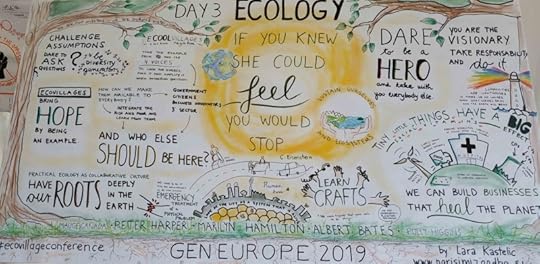
The impact of Charles Eisenstein from the Findhorn Climate Change and Consciousness Conference 2019 (attended by Marilyn Hamilton) took centre stage early on. Eisenstein’s emphasis and provocation at CCC2019 was framed as “If you knew she (meaning Gaia/Earth) could feel you would stop”. Hamilton had been deeply impacted by this image as it captured the belief that Earth was a living system – underlining that proposition of the Gaia Hypothesis originating with James Lovelock.
If Gaia is an evolutionary living system, then humans – and their cities, towns, villages and eco-villages are also alive. Hamilton framed the urban human habitats as Human Hives – sharing her learnings from the honeybees that we needed to include the 4 Voices of the city/eco-village if we are to bring the whole system to the table. Citizens, Civil Society/Third Sector, Civic Managers and Business/Innovators all have critical roles to play in responding to our planetary environmental challenges. And when we gather, we should always ask, “Who else should be here?”
Ecovillages need to be careful not to fall into consensus trance – but to use the example of the bees to practise diversity generation – we need to both DARE to ask questions and DARE to be a hero who can bring others on side. If you want to make a change – you must recognize yourself as a Visionary and take responsibility to “just do it”; i.e. be and do the change you want to see in the world.
Harper reminded us that we have our roots deeply in the Earth and Earth is suffering deep physical injuries caused by human action. To treat these physical injuries, we need to declare an environmental/climate emergency and respond with the legislative and big corporate systems with physical treatments that can operate quickly and broadly. Harper pointed out that when someone incurs an injury of broken bones and bodily harm (say falling off a bike) the emergency response first needs to treat the physical injury so that follow-up emotional, spiritual and cultural responses will have a live person to embrace with non-allopathic treatments.
Bates made a strong case that in fact we know how to build businesses that can actually heal the planet – he gave examples from many sectors including food production, energy generation and energy diagnosis. Bates also told the stories of how early (and even current) eco-villages who have survived, have required that residents become skilled (or re-skilled) at crafts – so people can contribute their personal trades, skills and manifesting capacities to actually “build stuff” (and not just theorize or design it).
Ultimately, the three panelists agreed that Eco-villages bring Hope because they provide living examples of people practising what they believe in and being accessible to other forms of human habitation and governance. The communities in eco-villages are real lighthouses in this (VUCA) time of Volatility, Uncertainty, Complexity and Ambiguity. The richness of our panel discussion was carried on in many conversations after the panel concluded (and translated into Open Space topics – even including cities!).
This short blog series explores our experience at and contributions to the GEN Europe 2019 Conference:
GEN Europe 2019 Conference in 4 Graphics
Preparing for the GEN Ecology Panel
Global Ecovillage Network Europe 2019 Ecology Panel
Integral City Prepares for Ecology Panel at GEN EU 2019 Conference
Before we arrived at the Global Ecovillage Network (GEN) 2019 European Conference we were interviewed with our fellow panelists on key questions. Here below is the interview with Marilyn Hamilton, Found of Integral City Meshworks Inc.
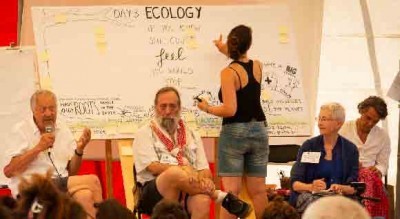
GEN: What Profile is Marilyn Hamilton bringing to GEN?
MH:
Marilyn Hamilton is the Founder of Integral City Meshworks Inc. and author of the Integral City Book Series.
When I talk about “Integral Cities” I am looking at human habitats of all sizes (from village to town to city to metropolises) including their eco-regions
The city is the most complex human system yet created.
I am passionate that we reframe the city as a Living System – an evolutionary organ of the Earth that builds on James Lovelock’s proposition that Gaia is a Living System and humans are her Reflective Organs – I think cities are the organs and people are cells in that organ
As Living, Evolutionary Reflective Organs cities are so complex that I use an Integral Framework that captures the individual and collective human groups at multiple scales, and multiple stages of evolution. This framework reflects the participants and priorities of the Integral City Master Code of Care: Self, Others, Place, Planet – where we care for Self so we can care for Others, so together we can care for our Place(s) and in doing so we care for the Planet.
One of the ways I engage human systems is through the Master Code of Care using the 4 Voices of the “Human Hive” – Citizens, Civic Managers, Business/Innovators and Third Sector/Civil Society
GEN: Ecology keynote questions and framing
Ecology is in the definition of our communities: the conference is where we learn of new practices in sustainable living, we share and draw inspiration from fellow ecovillagers. Those who are visitors will be able to experiment with a style of living that is comfortable yet at low impact Community living; bioconstructions and cultivation are all intrinsic to our lifestyle which will be shared with those who wish to join us during the meeting
Core theme and guiding questions:
We have 11 years to change to avoid irreversible climate change and biodiversity loss. We wish to address the perception that ecovillages have been effective on addressing local-level ecological regeneration, but are ineffective on larger scale, and therefore how we can amplify the impact of the community networks, both individually and collectively.
What are the international transition needs we are facing as a global community?
MH: There is a movement (through Frederic Laloux’s research) to reframe organizations as Teal Organizations (or Yellow in Spiral Dynamics Integral terms) – organizations that can serve a higher purpose and function as living systems. These types of organizations are slowly starting to come on stream with new values systems that flex and flow with environmental awareness. Where a critical mass of those arise, we will see the first “flickerings” of Integral City arising.
BUT before that – especially in the next 11 years we must create the conditions in our organizations and villages for Sustainability to fully flourish. We must go beyond even the SDG’s (as single targets) and create a fully functioning network of sustainable organizations – functioning like the ISO standards for manufacturing – only in this case where lead organizations require/demand that their whole supply chain performs according to fully accountable, transparent sustainability standards. I have written a Manifesto about this – it was published in Enlivening Edge and read/declared at the Wemakethe.city Amsterdam 2019 festival.
A copy is here http://integralcity.com/2019/06/09/manifesto-for-integral-city-climate-change-agenda-for-organizations/
I think that ecovillages have the opportunity to demonstrate the fully integrated flows of sustainability through both Placecaring as well as Placemaking. In Placecaring many ecovillages (e.g. Findhorn) have a strong coherence around Consciousness and Culture. These are critical for the long-term sustainability of Placemaking through technology and infrastructure systems.
GEN: Examples of how local community-led solutions can scale up
How can we bridge and scale-up the local to the bio-regional and national/international levels?
MH: I think eco-villages have the opportunity to model sustainability standards and supply chains – precisely because of the scale they are at. They can set internal supply chain standards within the village and then model/require it for any supplies coming in from elsewhere – thus “leaking” it into the system. They can also report on the “story” of how they are doing this as news items for local interest. Within/across GEN as this is done it can become a meta-network of commitment to Sustainability Supply Chains.
GEN: What can we learn from allied change processes that communities can adopt to address climate change and biodiversity loss on the scales we need?
MH: Perhaps an “allied change process” that could be useful is the use of what I call the “4 Voices” of the village/city = Citizens, Civic Managers, Business/innovators and Third Sector/Civil Society. When we make decisions and/or changes of any kind that can be effected/effective at village/city scale the 4 Voices must be at the table for the full system to be in the room.
I learned about these 4 Voices from the honeybees – who have 4 Roles that enable survival of the beehive as well as regeneration of their ecoregion (by their service of pollination). So, by living sustainably within our villages/cities we must set the goal to regenerate the resources we draw from our eco-region or elsewhere so that we are constantly renewing resource supplies.
GEN: How can we address the perception that ecovillage communities are seen as ‘hippies’ and ‘dreamers and highlight how the tools we have can be scaled up and be made palatable for mainstream?
MH: I consider ecovillages – including Findhorn where I live to be models that cities can learn from. They need to see the experiments and prototypes that can happen quickly at ecovillage scale and bring that back for adaptation to larger human habitats. So, the 4 Voices of the City should be learning from the 4 Voices of the Ecovillage. Ecovillages are in the interstitial zones where change can happen – and we need to invite the 4 Voices of the larger scale cities to listen, learn, connect and act. In fact, we can even encourage the development of urban ecovillages.
This short blog series explores our experience at and contributions to the GEN Europe 2019 Conference:
GEN Europe 2019 Conference in 4 Graphics
Preparing for the GEN Ecology Panel
Global Ecovillage Network Europe 2019 Ecology Panel
Global Ecovillage Network EU 2019 Conference in 4 Graphics
Integral City attended Global Ecovillage Network Europe 2019 Conference in Banaigh, Italy in July. We sat on a panel focusing on Ecology. But before, during and after our sessions GEN graphic facilitators recorded the conference panels in 4 Graphics. We share them below.
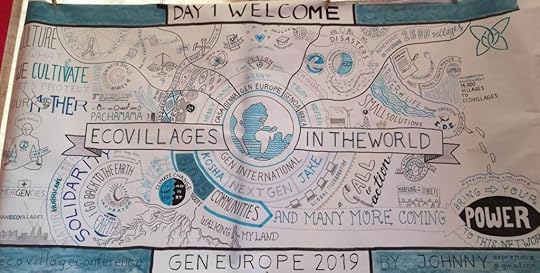
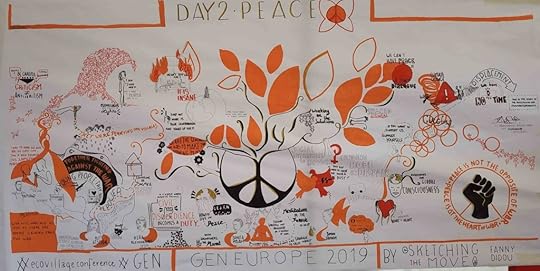
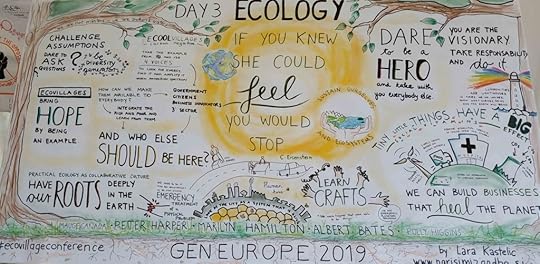
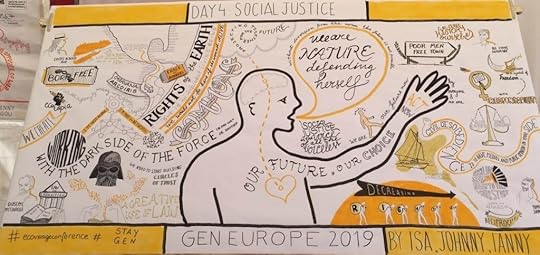 This short blog series explores our experience at and contributions to the GEN Europe 2019 Conference:
This short blog series explores our experience at and contributions to the GEN Europe 2019 Conference:GEN Europe 2019 Conference in 4 Graphics
Preparing for the GEN Ecology Panel
Global Ecovillage Network Europe 2019 Ecology Panel
Find out more about how Global Ecovillage Network is Catalyzing Communities for a Regenerative World here.
The Global Ecovillage Network envisions a world of empowered citizens and communities, designing and implementing pathways to a regenerative future, while building bridges of hope and international solidarity.
July 31, 2019
New Sincerity Manifesto – an Update
In January 2019 we published Oleg Lega’s New Sincerity Manifesto here.
At the Wemakethe.city 2019 Conference in Amsterdam Oleg delivered an updated version of his Manifesto when we delivered our Integral City Green Manifesto for Climate Action. We did this at DeCeuvel here.
Here below is the update to the New Sincerity Manifesto – Meet Feyda – Oleg’s son who inspired it all.
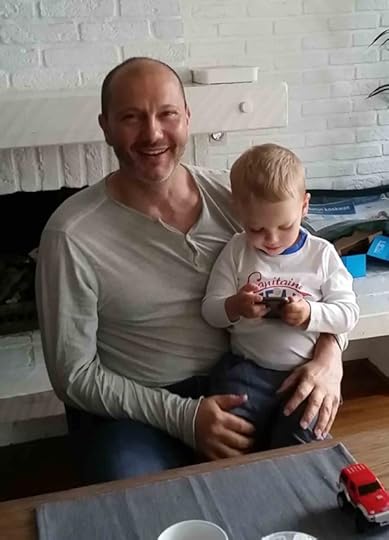 New Sincerity Manifesto
New Sincerity Manifestoby Oleg Lega
Meet Fedya. He is three years old. Like all children, he is from the future.
More precisely, though, our future becomes his present. This means that we can affect what awaits him and other children. Meanwhile, they cannot, they are defenceless against us. And my choices directly impact the world in which they, our children, will live.
A child is a wonderful part of our life: we continue in them, egotistically (as we transfer our genes), and altruistically (as we unconditionally love them).
And since we love our children so much, let us ask ourselves a question: what world will we leave to them? And just as we can understand the horrors of slavery of ages past, future generations will look with horror at the gigantic landfills and mountains of plastic we are leaving behind. So I go back to my question: do we love our children, or are we simply in love with the gratification they give us?
How can my child be happy in the future landfill of a world, stripped of all resources? Am I willing to subject them to future suffering, increase in natural disasters and unclean air to breathe? Will my children be able to achieve their very best, live happily or live comfortably? Which ideas will ignite the fires of inspiration for them? And what do we need to do for that to happen?
I believe that there will be demand for more honest ideas, companies and relationships than the ones we have today. And I want to hope that our children will be more sincere, and our world will be more sincere with-them. In many ways, this is already happening. The world has become more transparent; lying to yourself and the world is becoming more and more uncomfortable and unsustainable. Even giants like Volkswagen, get instantly caught in their lies when they lower emission figures and their shares crash.
This New Sincerity in the world prompts us to be authentic, instead of simply trying to look good. Our civilization no longer has any gurus, and every human being searches for their own answers, every day. The issues that we face become more and more urgent every day too.
This is true even for a serene Buddhist who seeks inner peace, and is used to viewing what is going on without becoming affected-by-it or having to label things one way or another. Because if I am a serene Buddhist (as much as I seek to become one), how can I distance myself from such facts as, say, garbage floating by in the river? My meditative contemplation of industrial waste and non-judgemental attitude to carcinogenic substances that we increasingly breathe in – don’t all these things matter to me? At that point is it still passive contemplation or does it become irresponsibility on my part?
This is where we finally come to the main idea. What I am going to say, will not be easy. First and foremost, for myself.
We have a word in Russian, ‘lichnost’ it means a person who transcends basic human identity to a higher level of social and collective responsibility. I was surprised to learn there is no English equivalent, so I will be using the term Transcendental Identity. I am hoping to get it into the dictionary soon. When we ask hard questions about the present (and, in fact, the future of our children), we expand the context of the modern understanding of the human Identity.
The Transcendental Identity appears when we rise above our biological nature, that is, daily work we do to become something more than just a physical body used for survival and propagation. And then I ask myself if I can refer to myself as having social responsibility as part of my identity, when I refuse to bear any responsibility for the world and the future. In other words, when I am not eco-conscious? After all, while 50 years ago our influence on the world around us was relatively minor, now what we do directly affects what awaits our children. And indeed, only those who make conscious choice, can be said to have a real Transcendental Identity.
Most people find it obvious that we should not pass by an adult who is treating a child badly. But what we need to grasp is that allowing the depletion of natural resources and the increase in global temperatures is directly causing exponential suffering for the children of the future. What was passivity or neutrality in the past now becomes neglect. When I put my groceries in a plastic bag, that is neglect. When I wash my face with products that contain micro plastics, that is neglect. Do I have enough critical thinking to see the following connection: the fewer resources and the more pollution we leave for future generations, the fewer chances that the same child I would save from violence when passing by, would survive and be happy beyond that moment?
Will it not be hypocritical on my part to say that I have a Transcendental Identity, if I read Dostoevsky, Goethe or Eckard Tolle but do not try to cut down on the amount of garbage I produce or do not recycle waste products? Or if I cannot teach myself to bring my own cup along so as to throw away 365 fewer plastic cups or bottles, each year?
And if the moral aspect of this has had no effect, then maybe the monetary ramifications will. Without eco consciousness in the very near future, all businesses, including mine and all of yours here today, will be of no interest to those who had only recently not considered ecology, and they will vote with their wallets in some other place. Not only do the children of the future rely on this New Sincerity, but our future businesses do too.
New Sincerity is the path to integration into today’s reality. How to be happy, whilst being successful. How to be successful, whilst being sincere and honest with our loved ones and ourselves. Or how to be both happy and successful, whilst not contributing to the death of our oceans and increase in pollution. After all, we are only able to contemplate happiness once our survival is ensured and our need for success is satisfied. Finally, I need to emphasize: I am not talking about ecology in the traditional sense at all. I am talking about the survival of our species. About our common world.
This is the call to be sincerer, to reengage with our own sincerity. This is the awakening to our higher potential of care for ourselves, our communities, our planet. The concept of New Sincerity is not about reproaching others or yourself for being wrong. It calls for transformation, for creating the ecology of our consciousness, the ecology of our consumption, the ecology of our behaviour and waste responsibility. How can we achieve Transcendental Identity? How can we become more mindful, more responsible, more loving when we observe ourselves doing things? How can we find it in ourselves to leave the world to our children in the condition that would make us happy today and them tomorrow?
This is the way of the New Sincerity. This is our call to be sincerer.
Oleg Lega, serial entrepreneur from Russia, Founder of BUSHE Group of companies, living in Amsterdam, member of Living Cities Russia, Strategic Council.
July 28, 2019
Co-Creating Europe: What Have Cities Got to do With It?
My exploration of cities as Gaia’s Reflective Organs, rests on the assumption that our planet Earth is a living system – as proposed by James Lovelock, author of the Gaia Hypothesis. In the last few months I have gathered confidence that this perspective that our planet is a living system is now being shared by a growing number of interdisciplinary experts – evolution biologist Elisabet Sahtouris, cosmologist/archeologist Jude Currivan, philosopher Charles Eisenstein, international legal expert Polly Higgins.
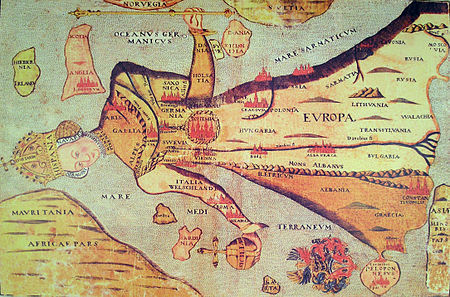
Figure 1: Lady Europe [1]
This point of view was further affirmed by my participation in the Co-Creating Europe Inquiry in Plovdiv Bulgaria, July 10-15, 2019. This conference brought together inquirers from many cities located within an extended European map. Its location attracted Europeans centred around Plovdiv, the Cultural Capital of Europe 2019 – with strong representation from Bulgaria, Turkey, Romania, Hungary, Greece as well as Poland, Scandinavia, Netherlands, Switzerland – and not just the “usual” western voices of Europe. In my experience, this shifted the points of view away from Germany, France (England and Spain) who can often dominate the conversation of European identity. (Ironically the language for shared communication was English – in general a second language for most of the participants.)
Our exploration of the Co-creation of Europe was designed to start from eight Essentials that had been earlier identified by several Zoom calls in 2018-19, the Vision Team, the Design Core Team and the first gathering in Frankfurt 2018. (See the website for detailed explanations of the Essentials).
The Essentials included:
Unity
Universal/Spiritual
Evolutionary
Freedom/Human Rights
Ecological
Glocal/in Solidarity
Dialogical
Transsecular
As participants, we explored in small groups the meanings and implications of the Essentials for becoming a hub for a new post-national social form in Europe, further interconnecting themes emerged like “Healing” (especially exploring through the relationships of Victim, Tyrant, Rebel, Rescuer, Survivor, Witness).
My Open Space group also discovered that the possibility for a new post-national Europe could be framed by a 16th Century map, depicting Lady Europe – whose head touched the Azores and whose hem skirted the Urals, with river flows and mountain ranges strategically positioning her emerging cities (see Figure 1).
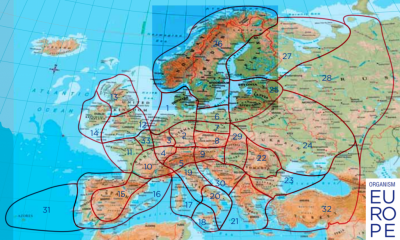
Figure 2: ECOIntention Organism Europe [2]
Moreover, Lady Europe’s countries seemed to presage two maps developed by the ECOintention Group that identifies the organism of Europe (Figure 2) and reveals the energetic strength of her centres (or organs) (Figure 3).
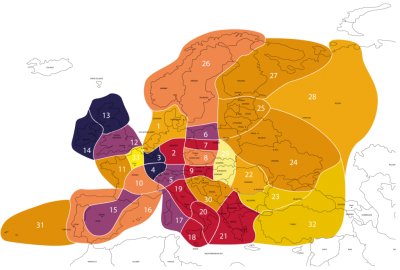
Figure 3: ECOIntention Map of Energetic Strengths for Organism Europe [3]
I have often pushed back against the dominance of nations as a valid form of organization that contributes to the wellbeing of our planet – they cannot be seen from space, and are ill-defined because they seem to embed human disrespect of ecological boundaries, like watersheds (a form of territory often used in indigenous peoples). This is why I have proposed that cities (as living systems with boundaries visible from space) are the more valid form of human system to embrace for generating insight and influence in complex contexts.
However, when I examine the maps in the 3 Figures above, I see the possibility that what has been revealed are the energetic centres of the eco-regions of cities. It is relevant that ECOintention names Europe as an “organism”. This organic approach to mapping living systems can bring into play the fractal nature of Planet, Europe and her Cities – a most interesting thought experiment. If it holds “water” the relationship of these 3 scales of living systems must be respected as integral to the wellbeing of each and all.
Which brings me to the central question of “What Have Cities Got to Do with Co-Creating Europe”?
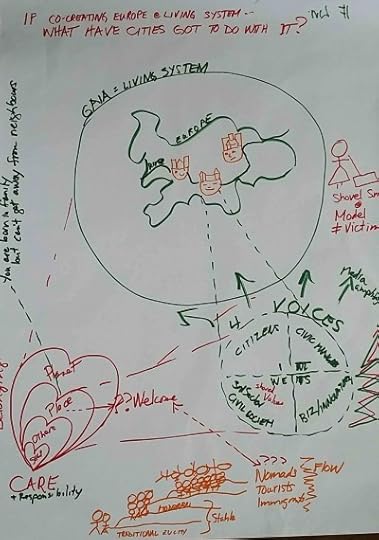
Figure 4: Locating and Appreciating the Roles that Cities Play in Co-Creating Europe
Firstly, cities have an organic role to play in vitalizing Europe as a living system. The cities of Europe act like her organs. They are all situated on her rivers, which enable the flows of energy, matter and information throughout her living system. As a result, cities and (ecoregional) rivers have always played a major role in the flow of people and resources throughout Europe and onto the greater Planet.
Each city of Europe has the potential to integrate the 4 key voices of the city as a living system. Bringing these 4 voices together around the table enables each city to function using the 8 Essentials defined above:
Citizens
Civic Managers
Business/Innovators
Civil Society/3rd Sector
Moreover, each city acts a s a 5th voice within an eco-region (per ECOintention map and/or River Zone)– to compare, contrast, and learn from each other. Co-creating Europe as a new post-nation hub cannot happen without the dialogue that the 4+1 voices of her cities naturally provide.
Within each city operates the Master Code of Care. This is another fractal principle used by Integral City that we believe will become the core of evolving new governance for Europe. This Code says simply that every time we make a decision, take action, relate to others and co-create we should align:
Care for Self (so that we can)
Care for Others (so together we can)
Care for Place (so altogether we can)
Care for our Planet.
In these times of dynamic change in Europe, the patterns of people-flow are bringing pressures on both her ecological river systems and her traditional city structures and infrastructures. We find that the previously homogenous cultures and consciousness (of city language and traditions) have been impacted by three types of nomads who are flowing at high volume into, through and out of Europe’s cities:
Digital
Tourists
Immigrants
Thus, our nomads are evolving the perfect conditions for re-imagining and co-creating Europe. What have cities got to do with it? Everything. It is only by embracing the 8 Essentials with the 4+1 Voices that the greatest Care can be manifested for the greatest good of all life in Europe. For this exploration reveals that Europe herself, is a vital organ of Gaia and none of us can be healthy without her.
Links:
[1] Europa Regina Wikipedia https://en.wikipedia.org/wiki/File:Eu...
[2] ECOintention Europe Energy Centres
https://www.google.com/imgres?imgurl=...
[3] ECOintention energy assessment map of Europe https://www.google.com/url?sa=i&source=images&cd=&ved=2ahUKEwip0KyflM3jAhVSQBoKHSmMDhoQjRx6BAgBEAU&url=https%3A%2F%2Fwww.help2healeurope.org%2F&psig=AOvVaw3mnYAK-10QTo4vU2GgJmuI&ust=1564043969704163
Marilyn Hamilton's Blog
- Marilyn Hamilton's profile
- 3 followers



